New bylaw aims to protect Montreal's Chinatown, limiting real estate development

Montreal's executive committee adopted a new bylaw Wednesday, limiting the height of buildings in the city's Chinatown neighbourhood with the goal of preserving the area's heritage.
The new rules follow a report by the Office de consultation publique de Montréal (OCPM) last October, which put forward nine recommendations to protect the historical nature of the area.
"We wanted to be fast, we wanted to be prompt, because the OCPM and the community who participated in these consultations wanted us to move forward," said Robert Beaudry, the executive committee member responsible for urban planning.
The new bylaw will also limit the density of the neighborhood and expand the borders of Chinatown's protected area.
Previously, Chinatown was defined as the area within Jeanne-Mance St., Saint-Dominique St., Viger Ave. and René-Lévesque Blvd. That has now been extended both east and west, to Sainte-Élisabeth and De Bleury streets.
It's the latest in a series of recent moves to better protect the historic sector. Last January, the Quebec government also signed notices of intent to protect the area under the Quebec Cultural Heritage Act.
It's a relief for residents and advocates, who say recent efforts to build up the area were threatening the neighbourhood. In recent years, real estate developers bought up many of Chinatown's heritage buildings.
May Chiu, the co-coordinator of the Chinatown Roundtable, says the new bylaw is a great first step to protect the area from gentrification.
"My very first job as a youth ever was in Chinatown, when doors were closed to me everywhere else," she said. "Chinatown is a marker for Asian identity."
Now, she hopes the city will go further, to make sure the buildings and space in the area are "destined for community space, especially the needs of the most vulnerable who live in Chinatown."
The new bylaw is expected to be ratified by Montreal's city council later this month.

 Yahoo Movies
Yahoo Movies 
